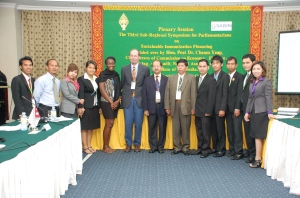As 2010 comes to a close, Nepal is eyeing the establishment of a national trust fund as a way to ensure sustainable financing for its national immunization program. The groundwork for this important step was laid over the year by a host of stakeholders. Several preparatory meetings brought together Ministry of Health and Ministry of Finance officials with parliamentarians and private sector leaders to discuss the options.
The Nepalis developed the trust fund concept in league with their Cambodian and Sri Lankan counterparts. Threes sub-regional parliamentary briefings, supported by Sabin, were held in Kathmandu (9-11 February), Colombo (15-16 July), and Phnom Penh (21-22 October). In February, the parliamentarians adopted the “Kathmandu Declaration”, in which they committed to work for sustainable immunization financing for Nepal. UNICEF/Nepal has played an important role, first by co-sponsoring some of the briefings, then by providing technical support to the Nepali parliamentary and governmental counterparts. In the July Colombo briefing the delegates exchanged more information and generated the “Kathmandu to Colombo and Beyond Declaration”, which called upon all three governments to find innovative ways to increase routine immunization budgets. The Declaration also called on national immunization program managers to begin monitoring and reporting program expenditures along with coverage and surveillance data. At the meeting in Phnom Penh, the countries elaborated lists of short-term actions they will take to move them closer to the sustainable immunization financing goal. Again the delegates produced a “Phnom Penh Declaration”, this time highlighting the urgency of achieving the Millennium Development Goals and asking for in-year reporting from the ministries to parliament on immunization program performance. With these elements in place- policy directives, better reporting, a sense of urgency- the trust fund becomes feasible.
Throughout 2010, the Rotary Clubs of Nepal also played a key role in turning the country into an SIF champion. The clubs set up and capitalized a precursor fund, assessing each member US$80 to get it started. The Rotarians had participated in national SIF briefings in June and October. Today there is consensus that achieving sustainable immunization financing will require attracting more domestic resources from national business/corporate houses. The fund will allow firms to demonstrate their corporate social responsibility while accruing tax breaks. The goal is to establish a fund independent of the current external partner pooled funding arrangements for immunization. All contributions received will be seed money. The interest income from the seed money will be provided to the government to procure vaccines. As soon as the government establishes a legal mechanism, the partners agreed, ownership of the trust fund will be shifted to the government. The growing number of new stakeholders puts pressure on the government to speed up the process of creating the national immunization trust fund. At a brainstorming meeting on 28 December, members of the Rotary Club of North Kathmandu announced they had so far contributed NRs 137350 (about US$1900) to the interim fund.
Legislative work is also required to set up a trust fund. In a series of recent meetings, senior officials from health, finance and planning ministries have taken on the task of crafting a “National Immunization Act” to support the national immunization trust fund. The Ministry of Health has inserted these two activities into its annual program. The plan now awaits the approval of the National Planning Commission. These institutional innovations demonstrate the important effects new domestic and legislative stakeholders can have on the highest policy levels of government.
Among senior officials crafting the trust fund are Hon. Dr. Chet Raj Pant of the National Planning Commission; Mr. Vidyadhar Mallik, Vice-chairman of the Nepal Poverty Alleviation Fund; and, from the Ministry of Health, Dr. YV Pradhan, Director General of Department of Health Services; Dr. RP Bichha, Director of Child Health Division; Mr. KB Chand, Chief EPI Section; and Dr. Padam Bahadur Chand, Chief of the Policy, Planning and International Cooperation Division. Also involved are officials from the Parliament Secretariat; a representative from Ministry of Finance; representatives from WHO, UNICEF, Rotary and others.
The Nepalis are currently studying immunization laws from three Latin American countries (Bolivia, Costa Rica and Paraguay). The laws have been effective. Latin American governments now finance over 95% of their national immunization budgets. Their view is that the Immunization Act and Immunization Trust Fund must be developed simultaneously. The next step is for the Ministry of Health to win approval from the Cabinet of Ministers. This will require advocacy at the highest level. The team is forming a Technical Working Group to work on this task. The group will bring together immunization experts, legal officers and others high level officials to prepare a justification for why the Act and the Fund are necessary. Assuming they succeed, another high level meeting will take place with the Secretaries of Finance, Health and Law & Justice.
The Nepali delegation is expected to present their immunization trust fund case study at a Parliamentary Colloquium on Sustainable Immunization Financing, which SIF is organizing in Addis Ababa the last week of March 2011. Similar immunization trust funds are being organized by parliamentary and government counterparts in DR Congo and Cameroon. Mali, Senegal and Sri Lanka are also studying the idea. The Nepali case will be the first to demonstrate how a poor country can nevertheless make headway on the path to sustainable immunization financing.










